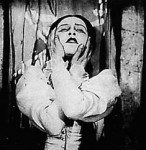 Continuing with my series on depression and suicide in Paganism, this week I’m going to focus on some complimentary therapies to aid you if you are dealing with depression. Please note that once again, these in no way replace Western medicine. Antidepressant and anti-anxiety medications save lives. But if you need something to hold you over until you can get to the doctor, or if you want to use these options in compliment, they can be helpful.
Continuing with my series on depression and suicide in Paganism, this week I’m going to focus on some complimentary therapies to aid you if you are dealing with depression. Please note that once again, these in no way replace Western medicine. Antidepressant and anti-anxiety medications save lives. But if you need something to hold you over until you can get to the doctor, or if you want to use these options in compliment, they can be helpful.
Once again, I am not a medical doctor. I am, however, a certified herbalist and a Reiki master/teacher.
Herbalism
Unless otherwise stated, the proper dose of an herbal tea is one teaspoon per cup or three heaping tablespoons per teapot. If you are going to make use of herbal therapies, you would be well-advised to check with both a doctor and a pharmacist to be informed about potential risks.
St. John’s Wort is probably our best herbal antidepressant, and it is the most prescribed antidepressant in Germany. You have to take a good dose of it daily and it makes you photosensitive. Like other antidepressants, you have to let it build up in your system before it will work properly. Take one cup each morning for a week, then one cup each morning and night. Give it a couple of weeks. But please do not take St. John’s Wort in conjunction with any other antidepressant because it can mess with the balance and either enhance or diminish it, and the mixture of the two can be dangerous. The medical term for this is a contraindication. St. John’s Wort is contraindicated when using other antidepressants or anti-anxiety medication; or when using sleep aids, since it can make you exceptionally drowsy. And, as previously mentioned, it is contraindicated when using anything else that increases photosensitivity. Whatever you do, don’t use suntan lotion or skin peelers while using it! And you should also not use it if you have high blood pressure. This is a serious medication with powerful effects, and you really should consult a doctor before using it.
Treating the concurrent symptoms can help also. If you suffer from anxiety, valerian root will help stop anxiety attacks and help you to sleep properly. But only take it when you have to because Valium was derived from it, and like Valium, you can build up a dependency. Again, valerian root is contraindicated when taking any anti-anxiety medication or anything that causes drowsiness, possibly up to and including antihistamines. If you’re going to take it, you should try it when you don’t have to work or drive and see how it affects you.
Chamomile, lavender and peppermint tea are milder anti-anxiety herbs that can help in the short-term. And generally they’re pretty much harmless to everybody. Chamomile knocks me out so I wouldn’t use it with sleep aids myself; actually, I often use it as a sleep aid. Of course, YMMV.
If you live in Colorado or Washington State and you smoke cannabis, scientific data will support that it is effective in treating anxiety; though do note that in some cases, people who use cannabis, especially if they do so regularly, experience an increase in anxiety and paranoia, so be cautious. Of course, it is illegal elsewhere in the US. Also, it makes you drowsy (some varieties more than others, but it does.) It is proven to increase your appetite and hinder your motivation, so if your depression is such that it saps you of energy, I wouldn’t advise it. Nor would I if your job requires you to operate heavy machinery or drive. Last but not least, cannabis can be addictive for some people. There are a variety of contraindications, most of them linked to increasing the effects of the drugs that treat the conditions that physicians allow for when prescribing medical marijuana, and there is some evidence that it can increase feelings of paranoia, so if that’s part of your condition, you should avoid it.
If it’s lethargy you suffer from, chai tea and earl grey tea can help perk up mood, but don’t use coffee or smoke; caffeine and nicotine are good short term pick-me-ups but the subsequent crashes can be just as damaging as a sugar-high. Chocolate, on the other hand, produces endorphins and is proven to actually help. No, seriously. But you have to balance the sugar crash issue, which produces highs and lows of emotion just like any other drug.
Aromatherapy
Essential oils can have very beneficial effects on mood. Try diffusing vanilla or lavender oil to aid in relaxation (you only need a few drops in some water in a diffuser; it will burn better that way.) Citrus oils and rosemary improve positive mood and thoughts, and you can keep clary sage on hand to dab on your temples to ease anxiety and PMS.
The reason why chai tea and earl grey tea are effective in improving mood is that they contain essential oils that help. Chai’s cinnamon, cardamom and clove heighten energy levels and relieve anxiety, and earl grey contains bergamot, which heightens mood and raises energy like citrus oil.
Exercise
There are several studies that tell us that exercising regularly can be of incredible benefit in balancing mood and improving well-being. It can be hard to motivate oneself to exercise when one is depressed, but it really doesn’t take much to have a beneficial effect. Fifteen minutes of aerobic exercise a day; that’s it. A light walk after dinner improves your digestion as well (which improves mood also). I do a short yoga routine called the Five Tibetan Rites myself, when I’m not doing some mixed martial arts practice. Even if your mobility is restricted you have options.
Light Therapy
Numerous studies have also shown that a lack of sunlight can cause all kinds of detrimental effects on mood, with long-term health consequences. This can be caused by seasonal changes, shift work, graveyard schedules, living in northern climates and mountainous regions, even by working in an office all day. You require fifteen minutes of full-spectrum sunlight directly on your retinas each day to maintain good mental health. Getting a full-spectrum sun light for use in the darker months was the best therapy I could have found. That alone improved my quality of life more than I could have imagined; well worth my $200 investment, which I had to save up for.
Meditation and Trancework
Studies indicate that transcendental meditation has a beneficial effect on mood; enough that it is often prescribed as part of a course of therapy. I’ve done a lot of work on understanding altered states of consciousness and how they affect you, and all of them are beneficial.
There are five major states of consciousness. Briefly, beta consciousness is left-brain thinking and communication, and people who produce lots of beta waves have more positive thoughts. Alpha consciousness is daydreaming and zoning out on the TV, and people who produce lots of alpha waves are less anxious and more relaxed. Gamma consciousness (high beta consciousness) is where divine inspiration and being “in the zone” takes place, and having those moments makes us feel spiritually fulfilled and inspired. There are two other major states of consciousness but they have unique benefits we’ll be dealing with in later sections.
Alpha consciousness is where creative visualization takes place, which allows us to see ourselves in better circumstances or succeeding at goals. It also produces greater feelings of relaxation and contentment. Our society doesn’t teach us to relax into alpha consciousness; in fact, for most of us this was actively discouraged in our childhood. Perhaps this might be one of the reasons why anxiety disorders are on the rise.
Meditation typically takes us into alpha consciousness and most magick is done on this level. So doing ritual is good for your mental health!
Soul Retrieval and Pathworking
The level of consciousness where deep dreaming and the stuff we typically think of as “trance” takes place is theta consciousness. A particular theta frequency, 4.5 Hertz, is commonly called “shamanic consciousness.” Shamanic journeyworking and trancework takes place here, as does most hypnotherapy. The brain in this state is highly suggestible and creative, and therefore, you can make it work for you to program whatever messages you want. This includes affirmations, guided meditations, and soul retrieval work. Using journeyworking to heal old traumas can be amazingly therapeutic. Indeed, psychologists and therapists often include this sort of work in their therapy these days, though of course they use different words to describe it. If you don’t know anyone who knows how to do soul retrieval or guided meditation work, try recording your own self-directed guided meditations. You can work with difficult issues from your past, or create a more positive scenario for your future. The possibilities really are mind-boggling.
Psychedelic Therapy
On the cutting edge of experimental psychology, numerous studies, including the Harvard Psilocybin Project in the 60s had enormous success treating psychological issues such as PTSD, anxiety disorders and addictions. People have reported great success with ayahuasca in dealing with such issues, and current research is utilizing magic mushrooms to treat PTSD in war vets. There are significant risks in using hallucinogens. Some of them are deadly poisons in large doses, and others can cause permanent changes to the brain, resulting in mood disorders or psychosis. I urge you to research this extensively if you intend to experiment and I would like to emphasize that the long-term effects of these substances are in no way sufficiently documented. Do keep in mind that in the United States, possession of hallucinogens is a felony on the level of cocaine possession.
Alternative Healing
Many people have reported benefits from Reiki, acupuncture, shiatsu, bodywork, and other complimentary therapies that utilize the body’s own natural healing capabilities. Most of these methods are still under study, but Reiki and acupuncture now have some degree of support in the medical community; Reiki is often encouraged in hospitals and palliative care facilities, and acupuncture is covered by many insurance plans.
Proper Sleep
It’s amazing how many ailments are linked to not getting proper sleep, and depression is one of those ailments. Also, chronic pain, which often contributes to depression, is relieved by getting sufficient delta wave sleep; which can be difficult. There are sleep tapes and music out there designed to induce delta waves, and not only do they aid sleep, they can relieve chronic pain. Check out YouTube and type in “delta wave music.” And you can find similar music for all the other kinds of brain waves too.
Next column: The Downward Spiral – Depression and Suicide in Paganism (Part Four)
Seekers and Guides is published on alternate Mondays. Follow it via RSS or e-mail!

















